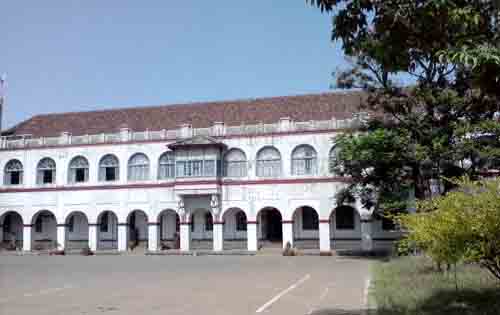Madikeri Palace

Information on Madikeri Palace (Coorg, Karnataka) - History & Architecture
Madikeri Palace is located in the Madikeri Fort. It is the district of Kodagu (Coorg), in the state of Karnataka in South India. It was built in the second half of the 17th century by Mudduraja. Later, it was finally rebuilt by Tipu Sultan in granite with Islamic architectural influence. Tipu named this site as Jaffarabad. Doddavira Rajendra took control of the fort and its palace in 1790. In 1834, it passed to the hands of the British. In 1812-1814, this particular palace was grandly renovated by Lingarajendra Wodeyar II. In the south-east corner, a church is located and at the entrance in the north-east corner, there are two life size masonry elephants which are major attraction for the visitors.
Madikeri Palace Architecture
The prominent Halero King named Mudduraja who successfully ruled Kodagu region from 1633 to 1687 followed unique architectural patterns and designs. At the main entrance of the fort, there is a Lord Ganesha temple popularly known as "Kote ganapathi". This temple is built as per the Hindu temple architectural pattern and style. The fort and its palace are situated on a high ground. These structures are perfectly blended with medieval and modern architectural styles. During the British period, the palace as rebuilt in the European style perfectly blended with local tradition and customs of Kidugu region.
On the entrance wall of the Palace, stand attractively sculptured horses rightly holding up the large balcony. The palace is said to be having secret underground routes for escape in times of danger or emergency. It is to be remembered that to the left of the palace, stands stone replica of two mighty elephants are erected. It is to be noted that it as erected by King Viraraja as a mark of great regret for the sudden and brutal killing of the Royal elephants. The Fort also houses a museum and a chapel within its premises. The museum displays many royal antiques such as stone carving, canon, medieval and modern weapons and canons.
Madikeri Palace History
The history of Kodugu has many specialties associated with this hill station. According to the historians, Kadambas riled the northern part of Kodagu from the 2nd to the 6th century AD and the Gangas ruled the southern part of Kodagu from the 4th to the 11th century. Later, Cholas became successfully the rulers of Kodagu after defeating the Gangas in the 11th century. The Hoysalas defeated the Cholas in the 12th century. On the other hand, in the 14th century, Kodagu directly fell to the Vijayanagar kings. It is to be noted that much later the Haleri kings ruled this hilly region from 1600-1834 AD. They made the place named Haleri, near Madikeri as their capital city. The third Haleri king named Mudduraja started perfectly leveling the vast land in and around Madikeri. He built a fort and a palace in the year 1681. The actual Fort was initially built of mud. It was later replaced by Tipu Sultan. After 1834 AD, Kodagu significantly became the strategic part of British India.
Madikeri Palace Tourism Importance
The Fort and its palace are visited by domestic and foreign tourists throughout the year. It really needs a day to go around the fort and its palace. The palace attached museum has a good collection of traditional and cultural items exclusively belonging to the Kodugu region. This hill station is the best place in Karnataka to spend the vacations and holidays. It is a pleasant tourist destination to spend good time with family members and close friends.
- Bangalore Monuments
- Bagalkot Monuments
- Belgaum Monuments
- Bellary Monuments
- Bidar Monuments
- Bijapur Monuments
- Chitradurga Monuments
- Coorg Monuments
- Dakshina Kannada Monuments
- Gadag Monuments
- Gulbarga Monuments
- Hassan Monuments
- Mysore Monuments
- Raichur Monuments
- Uttara Kannada Monuments
- Yadgir Monuments
- Andaman Nicobar Monuments
- Andhra Pradesh Monuments
- Assam Monuments
- Bihar Monuments
- Chhattisgarh Monuments
- New Delhi Monuments
- Goa Monuments
- Gujarat Monuments
- Haryana Monuments
- Himachal Pradesh Monuments
- Jammu and Kashmir Monuments
- Karnataka Monuments
- Kerala Monuments
- Madhya Pradesh Monuments
- Maharashtra Monuments
- Odisha Monuments
- Punjab Monuments
- Rajasthan Monuments
- Tamil Nadu Monuments
- Telangana Monuments
- Uttar Pradesh Monuments
- West Bengal Monuments